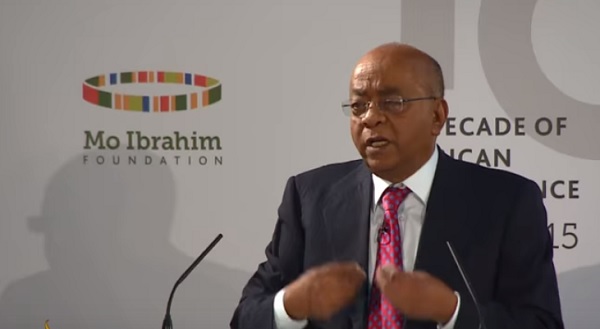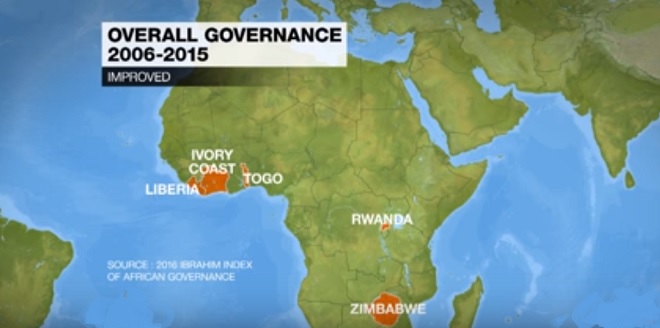
Security hampers 10-year African governance growth
London, United Kingdom | AFP |
Governance in Africa has gradually improved over the past 10 years but has been held back by deteriorating security and the rule of law, an annual index tracking development showed Monday.
Some 70 percent of African citizens now live in a country that has improved in overall governance since 2006, showed the 10th annual Ibrahim Index of African Governance, launched in London.
Across Africa, there were advances in human development; participation and human rights; and in sustainable economic opportunity. However, safety and the rule of law fell back.
Almost two thirds of Africans live in states where security and the rule of law have plunged, notably in Libya, the Central African Republic (CAR) and Burundi.
“The improvement in overall governance in Africa over the last decade reflects a positive trend in a majority of countries,” said founder Mo Ibrahim, the Sudan-born telecoms tycoon.
“The decline in safety and the rule of law is the biggest issue facing the continent,” he said.
Mauritius top, Somalia bottom
In the 2016 index, the top five countries overall, scored out of 100, were Mauritius (79.9), Botswana (73.7), Cape Verde (73.0), Seychelles (72.6) and Namibia (69.8).
The bottom five were Eritrea (30.0), Libya (29.0), CAR (25.7), South Sudan (18.6) and Somalia (10.6).
The annual index’s 10th anniversary gave an opportunity to look at how countries have performed over a decade-long period.
The index ranks countries using figures derived from 95 indicators grouped under four overarching categories.
Over the 10 years in which the index has been running, Ivory Coast has been the biggest riser, up 13.1 points, ahead of Togo and Zimbabwe, both up 9.7 points; Liberia, up 8.7; and Rwanda, up 8.4.
Ivory Coast’s rise has been driven by progress in participation and human rights, and in safety and the rule of law, in which it registers the largest improvement on the continent.
The biggest fallers have been Libya, down 18.0; Madagascar, down 7.6; Eritrea, down 5.6; CAR, down 4.9; and Mali, down 4.7.

IT driving change
Across the 95 indicators, the best improvements across Africa over the past decade were in digital and IT infrastructure (up 23.6), human rights conventions (up 15.7) and child mortality (up 14.2) — a category in which every country registered progress since 2006.
The worst falls were in the soundness of banks (down 21.5), government involvement in armed conflict (down 18.2) and safety of the person (down 15.9).
The greatest improvements in the business environment were registered in Niger, Rwanda, Ivory Coast, Togo and Kenya.
Valerie Amos, Ibrahim Foundation board member and a former British international development minister, hailed the fact that citizens in 37 out of 54 countries were living in countries that had improved in governance since 2006.
The one-point average rise is “not a huge improvement over 10 years but it is about the importance of direction of travel,” she told AFP.
She said improving transparency and accountability were “absolutely the key” to better governance.
“I remain cautiously optimistic about the future of the continent,” she added.
Here is the 2016 Ibrahim Index of African Governance.
The index is now in its 10th year and has published this year’s table along with figures showing how countries have fared over the decade measured (2006-2015).
(Rank; Country; 2015 score out of 100; 10-year trend)
Ibrahim Index:
1st: Mauritius 79.9 (+2.3)
2nd: Botswana 73.7 (-0.5)
3rd: Cape Verde 73.0 (+1.9)
4th: Seychelles 72.6 (+4.0)
5th: Namibia 69.8 (+3.6)
6th: South Africa 69.4 (-1.9)
7th: Tunisia 65.4 (+3.4)
7th: Ghana 63.9 (-2.1)
9th: Rwanda 62.3 (+8.4)
10th: Senegal 60.8 (+3.7)
11th: Sao Tome and Principe 60.5 (+2.9)
12th: Kenya 58.9 (+5.1)
13th: Zambia 58.8 (+4.3)
14th: Morocco 58.3 (+5.7)
15th: Lesotho 57.8 (+0.3)
16th: Benin 57.5 (+0.7)
17th: Malawi 56.6 (+1.1)
18th: Tanzania 56.5 (-0.6)
19th: Uganda 56.2 (+3.4)
20th: Algeria 53.8 (-0.6)
21st: Ivory Coast 52.3 (+13.1)
21st: Mozambique 52.3 (-1.8)
23rd: Burkina Faso 51.8 (+1.0)
24th: Egypt 51.0 (+3.5)
25th: Mali 50.6 (-4.7)
26th: Comoros 50.3 (+3.7)
27th: Niger 50.2 (+5.9)
28th: Liberia 50.0 (+8.7)
— African average 50.0 (+1.0) —
29th: Swaziland 49.7 (+1.0)
30th: Sierra Leone 49.4 (+3.8)
31st: Ethiopia 49.1 (+7.0)
32nd: Gabon 48.8 (+1.5)
33rd: Madagascar 48.5 (-7.6)
33rd: Togo 48.5 (+9.7)
35th: Gambia 46.6 (-3.9)
36th: Djibouti 46.5 (+2.3)
36th: Nigeria 46.5 (+2.5)
38th: Cameroon 45.7 (-0.1)
39th: Zimbabwe 44.3 (+9.7)
40th: Mauritania 43.5 (-2.7)
41st: Guinea 43.3 (+1.9)
42nd: Congo 43.0 (+2.6)
43rd: Burundi 41.9 (-2.1)
44th: Guinea-Bissau 41.3 (+4.0)
45th: Angola 39.2 (+5.0)
46th: Democratic Republic of Congo 35.8 (+2.7)
47th: Equatorial Guinea 35.4 (+2.0)
48th: Chad 34.8 (+2.3)
49th: Sudan 30.4 (-0.6)
50th: Eritrea 30.0 (-5.6)
51st: Libya 29.0 (-18.0)
52nd: Central African Republic 25.7 (-4.9)
53rd: South Sudan 18.6 (No 10-year comparison)
54th: Somalia 10.6 (+0.3)
Trajectories:
Top three risers over 10 years: Ivory Coast (+13.1), Togo (+9.7), Zimbabwe (+9.7)
Top three fallers over 10 years: Libya (-18.0), Madagascar (-7.6), Eritrea (-5.6).
Four biggest fallers from peak score (alphabetical order): Gambia, Libya, Mali, Mozambique
Three biggest bouncebacks from worst score (alphabetical order): Egypt, Kenya, Zimbabwe
Three top flatliners since peaking (alphabetical order): Angola, Ethiopia, Zambia
 The Independent Uganda: You get the Truth we Pay the Price
The Independent Uganda: You get the Truth we Pay the Price



